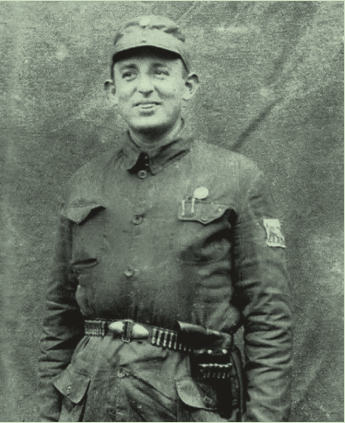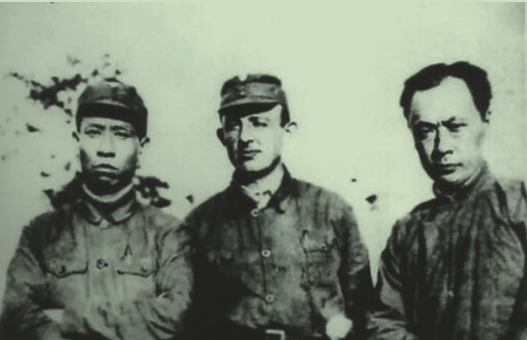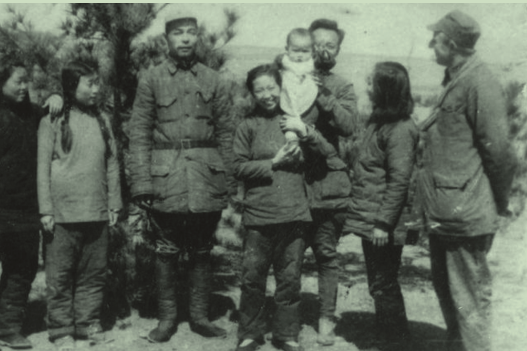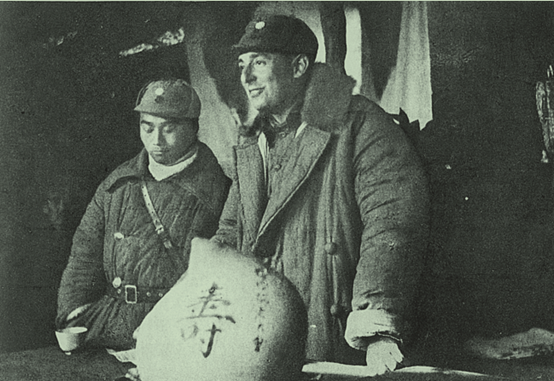Jakob Rosenfeld: An Austrian Doctor Who Made Outstanding Contributions to China
2021-09-15 14:04:40 | Author:Shan Wei

Rosenfeld in a uniform of the New Fourth Army
Jakob Rosenfeld
Jakob Rosenfeld, an Austrian medical doctor, came to China in 1939 and joined the CPC in 1942. He loved the Chinese people dearly and worked in the CPCled People’s Army for eight years. He had superb medical skills and was highly responsible for his work. He trained many doctors and nurses and played a crucial role in improving health services in the Chinese armyand in the liberated areas. He was hailed as a “Bethunestyle internationalist fighter” and was deeply loved and respected by Chinese soldiers and people.
From Nazi Concentration Camp to China
Jakob Rosenfeld was born to a Jewish family in Austria in 1903. He was admitted to Vienna University in 1923. During college, he studied medicine and read Marxist books and books by Lin Yutang and other Chinese writers. He knew about Confucianism and was drawn by China’s 5,000-year history. Standing against Fascist Germany, Italy, and Japan, he took part in anti-Fascist movements at school and became a member of the Austrian Social Democratic Party. After graduation, he worked at a national hospital and obtained his medical degree in urology, obstetrics, and gynecology in 1928.
In 1938 Nazi Germany annexed Austria. Rosenfeld put up protests and was arrested and put into the Dachau concentration camp. Even when Nazis brutally tortured him, he still performed the duties of a doctor and treated his fellow campmates. He was later released but ordered to leave the country within a few days. When the camp’s authorities asked him where he would go, he answered: “I’ll go to China!”
In the spring of 1939, Rosenfeld arrived in Shanghai and opened his clinic there. He was a brilliant doctor and soon built a reputation. His income also grew. He saw the crimes of Japanese invaders and, after hearing about the fight put up by the New Fourth Army and the Eighth Route Army, Rosenfeld decided to go to the CPC’s antiJapanese bases where doctors and medicine were scarce, to do his part for the Chinese People’s War Against Japanese Aggression. With the help of Hans Shippe, a member of the German Communist Party,he gave up his comfortable life in Shanghai to work for the New Fourth Army.
Germany’s annexation of Austria
Austria and Germany are both ethnically Germanic. After the Nazi Party came to power, Hitler supported the Austrian Nazi Party and incited it to subvert Austria so Germany could annex Austria. In July 1934, Austrian Nazis launched an armed rebellion but were suppressed. In 1936, Nazi Germany forced Austria to sign a secret agreement, essentially controlling Austria’s internal and foreign affairs. Western countries such as Great Britain and France adopted a policy of appeasement. Hitler thus grew increasingly ambitious and became determined to annex Austria. In February 1938, Hitler met with Austrian Chancellor Kurt von Schuschnigg, asking him to sign a document that would put Austria under complete obedience to Germany. Hitler demanded a reply within three days and threatened war if he did not get it. Austria was forced to make concessions, but Hitler was still dissatisfied. With Hitler’s support, Arthur Seyss-Inquart, a Nazi party member, formed a cabinet in Austria. In March 1938, the German army marched into Austria. With the signing of the Law on the Reunification of Austria with Germany, Germany formally annexed Austria, thereby enhancing its economic and military strengths and strategic status. From then on, it became even more aggressive and brazenly executed its war plans.
A Special CPC Member
In mid-March 1941, Rosenfeld left Shanghai and arrived in the New Fourth Army’s headquarters in Yancheng, northern Jiangsu. The Army’s leaders Chen Yi and Liu Shaoqi met with him and welcomed his arrival at a gathering. Rosenfeld told the CPC members about the Austrian people’s fight against Fascist Germany and described the horrifying situation in the Dachau concentration camp. He was very happy to work for a CPC-led army fighting Japanese aggression and expressed the wish to contribute as a doctor. His speech touched the audience, and people shouted patriotic slogans in response.
Rosenfeld worked as a consultant to the health department at the New Fourth Army’s headquarters. Life was very hard in the base, as Japanese troops and KMT reactionaries constantly raided it. Rosenfeld strictly followed the rules required of the soldiers and never asked for special treatment. He marched with the soldiers and ate coarse food together. He had a horse but used it to carry t he wounded or medical equipment. Deeply af fected by the revolutionary spirit in the base, he took part in all kinds of political and cultural activities. He was optimistic and humorous; everybody saw him as a true comrade.

Rosenfeld (center) with Liu Shaoqi (left) and Chen Yi (right) in Yancheng, Jiangsu Province, 1941
Rosenfeld spoke highly of the CPC-led New Four th Ar my, praising its bravery, strict discipline, and close ties with the people. Devoting himself to China’s Anti-Japanese War, he wrote many poems and songs to express his strong compassion for the Chinese people and his determination to fight alongside them. He admired the CPC and supported its mission, platform, and guidelines. In the spring of 1942, he applied to join the CPC, and Chen Yi and Qian.Junrui acted as his introducers. His application was accepted based on the Party’s evaluation, and he became a special CPC member as the Party committee considered his foreign identity.
Devotion to Health Services
In the New Fourth Army, Rosenfeld devoted himself to treating the sick and wounded. He of ten kept working for more than a dozen hours, eating only one meal a day. He crossed enemy lines, whether day or night, to tend to the wounded across the frontlines. In July 1941, more than 20,000 Japanese puppet troops launched an offensive in Yanfu. Caring nothing for his safety during thebombardment, Rosenfeld demanded to go to the frontline and perform surgeries on the wounded.

Rosenfeld (first, right) in Shandong
Rosenfeld had to endure severe waist pain and kidney injuries due to his torture in the concentration camp, but he kept working day and night, treating patients and giving lectures to fellow health workers. He also visited patients in their homes. His heavy workload left his eyes bloodshot, and he lost weight. The army commanders asked him to take more rest, but Rosenfeld could not follow this order. He continued to give health checkups to soldiers and paid
home visits to his patients. He said, “The vocation of a doctor is to treat diseases. No matter when and where, you must treat patients as long as they are there. Even if you are ill, you cannot say no to patients as long as you can move.”
In 1943 Rosenfeld was invited to the CPC’s revolutionary base in Shandong. He did his best to treat Luo Ronghuan, the base’s leader. Thanks to his medical skills, Luo continued commanding the counteroffensives against Japanese invaders.
Rosenfeld helped treat female patients to relieve their pain. People called him “women’s savior”, and Shandong Military Command honored him as a model worker for his devotion and
integrity. In August 1944, Shandong Militar y Command held a ceremony to commend model workers. Rosenfeld was present and took a seat at the front. During the meeting, two farmers rushed in and pleaded with Rosenfeld to save a woman in difficult labor. Rosenfeld followed them to the woman’s home and found her already in a coma. There was no fetal heartbeat, and both mother and child were in extreme danger. Rosenfeld performed emergency measures and finally saved them. With a heart of gold, he won the respect and praise of the soldiers and people in the base area.

Rosenfeld (right) at a birthday party for the elderly of the Eighth Route Army’s
Shandong Military Command
Rosenfeld paid special attention to the cultivation of medical workers. To help the base increase its medical services, he seized every chance to teach medical courses and train doctors. At his proposal, the New Fourth Army Central China Medical School was established, recruiting 162 students in the first year. Rosenfeld taught courses on battlefield rescue and other theories at the school. For example, he gave lessons in practice, giving a detailed explanation of each case during ward rounds and before operations. For major operations and complicated cases, he gave pathological analyses and explained the diagnosis and treatment plans. During surgeries, he taught the other doctors the techniques and reminded them of the key points. Rosenfeld was very close to his translator, assistants, and coworkers. He was very kind to them and was a good
teacher and friend. Rosenfeld was strict in implementing medical regulations and protocols and set an example by taking the lead in their enforcement. Under his guidance and rigorous management,a series of regulations and rules were established at medical units, significantly improving health work.
During the War of Liberation, Rosenfeld followed the PLA to the northeast and served as a consultant to the general health depar tment of the Nor theast Democratic United Army. In the
autumn of 1946, he became the health minister of the Army’s First Column. He organized the medical units to support the troops’ operations and worked together with all the doctors and nurses on the frontline to save lives. He checked on every wounded soldier wit h complications and per for med surger ies on t he severely wounded. There were not enough doctors as wounded soldiers kept coming in. Between battles and when the troops set camp, Rosenfeld gave short-term training to health workers to strengthen the medical service for the troops.
In April 1949, the PLA began to cross the Yangtze River to fight KMT armies. New China was on the horizon, and Rosenfeld was full of hope. He missed his homeland, which had been liberated from Hitler’s rule, and applied to return to Austria. The army commanders hoped he could stay, and he said, “I will come back to China andwork for the friendship between our two countries…and join the efforts to build New China.” The CPC Central Committee approved his application. Liu Shaoqi received Rosenfeld in Tianjin and praised and thanked him for his outstanding contribution to China’s revolution in the Anti-Japanese War and the Liberation War.
In November 1949, Rosenfeld depar ted from Shanghai for Austria. In 1951, he passed away due to a heart attack while visiting relatives in Israel. He was only 48 years old. From 1941 to 1949, Rosenthal contributed his most precious years to the cause of the liberation of the Chinese people. His achievements will be recorded in history forever. As a symbol of friendship between the Chinese and Austrian people, Jakob Rosenfeld will forever be remembered and missed by the Chinese people.
[Key Word]Northeast Democratic United Army
After the victory of the Anti-Japanese War, the CPC adjusted its strategy in response to the KMT’s attempts at a civil war to annihilate the people’s revolutionary force. To execute the task of developing the northeast, the CPC transferred troops and officials from the liberated areas to the northeast. In October 1945, these troops merged with the local self-defense army to form the Northeastern People’s Autonomous Army, which was renamed the Northeast Democratic United Army in January 1946.
Source:
Shan Wei, Shared Ideals: The Communist Party Of China Its Cherished Friends From Around the World , FOREIGN LANGUAGES PRESS,2021.6
